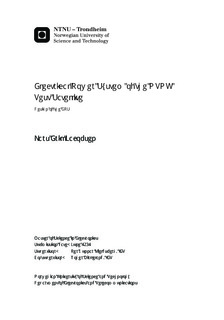Electrical Power System of the NTNU Test Satellite: Design of the EPS
Master thesis
Permanent lenke
http://hdl.handle.net/11250/2370511Utgivelsesdato
2012Metadata
Vis full innførselSamlinger
Sammendrag
The NTNU Test Satellite (NUTS) project is aiming to launch a 10×10×20 cm nanosatellite by the year 2014. The goal is to design and develope a low cost satellite by exploring the use of commersially available components. This work will focus on the power system of the NUTS satellite, which consists of a power distribution system, the backplane, and a power condition system, the Electrical Power System (EPS).This thesis describes the design and evaluation of the EPS module, which is a critical part of the satellite, because without power the satellite will not be able to operate. The electrical power system of the satellite consists of the solar cells, batteries, and voltage converters. With limited power available, the main focus of the design has been to implement an efficient system with minimum losses in power conversions.The Electrical Power System (EPS) module has been designed with simplicity, reliability, and redundancy in mind. The designed is based on the requirements of a reliable power source, with the main goals of charging the batteries with power from the solar cells and regulate the battery voltage down to the requested voltages of the backplane. A charger is chosen for its abilities to provide efficient and safe charging by using proper strategies for efficient energy harvesting and charging. To accommodate the voltage request of the backplane, four fixed value regulators is chosen for the design. For power monitoring of the provided power from the solar cells and batteries, current monitor sensors are implemented after each charger circuit and the batteries. Based on the specification of the solar cells and the batteries a final design of the main functionalities has been provided and a prototype of the EPS module has been produced.The proposed solution offers a reliable and redundant system, where a loss of one charger or converter will not mean the end of the mission. The EPS module has been tested and evaluated, and displays good performance results in terms of charging the batteries and voltage regulation. The efficiency of the EPS chargers is found to be 95 %.
